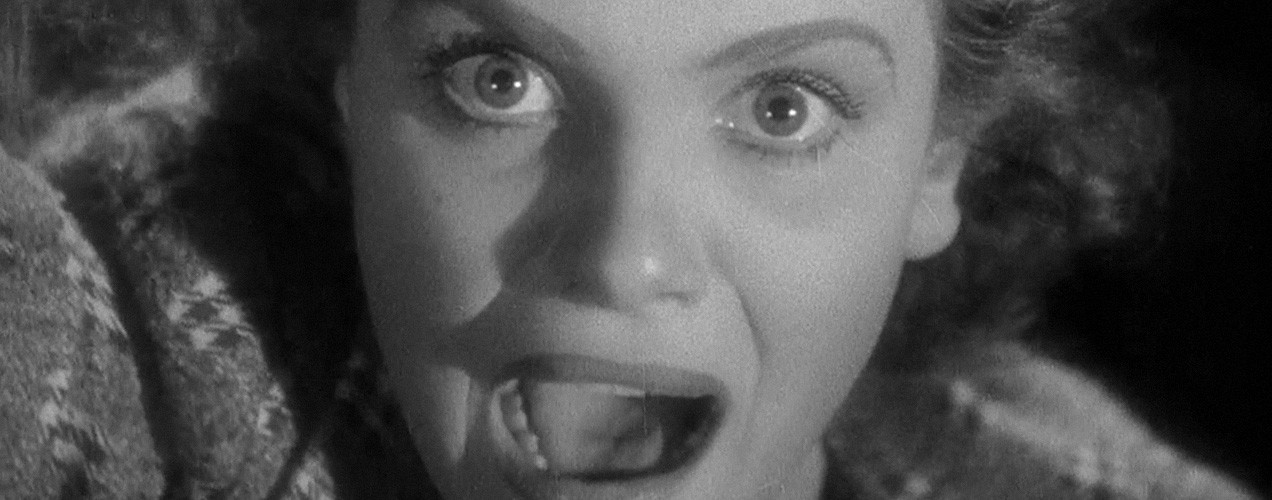Alfred Hitchcock / 1937 > An early Hitchcock with elements that would later be refined into his classics: A wrongly accused man on the run, a damsel who seeks to prove his innocence against conventional wisdom and a mysterious murderer lurking in the shadows. After a generic set-up, Young and Innocent, as it was known in the UK, powers through towards the climax as the leads finish their clue-hopping. Once backed against the wall, the climactic finale thrills the viewer by letting the camera tell a parallel story to unravel the mystery—a technique that has all the hallmarks of the director’s future brilliance.
Category Archives: Europe
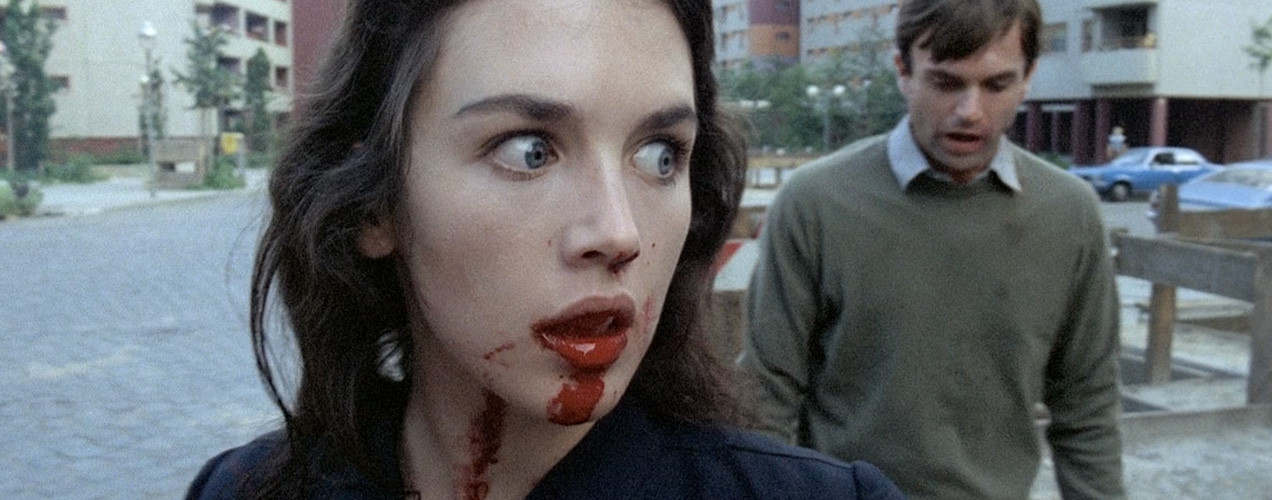
Possession
1981 / Andrzej Żuławski > There’s something about the madness of a beautiful woman whom you once loved. You know there was something in her that enticed you in the first place, and no matter how reckless she gets, that part of her gets you coming back for more. You don’t think about how it’s going to end, though you know deep inside that it won’t be well. You’re still intrigued, fascinated and find yourself going back for more.
Truth be told, I’m still pretty confused as to what it is that Żuławski has put in front of us, but I do know that in its unrelenting nature—with hints of Rosemary’s Baby and Vertigo—Isabelle Adjani’s performance alone is worth thrice the ticket price, watching her turn beauty into a mystical beast. Similar to Oshima’s take in In the Realm of the Senses, Possession is a dark tale of consumption, of passion beyond reason (or maybe of perfect reason?). It is absolute but not for everyone.

The Skin I Live In
2011 / Pedro Almodóvar > Almodóvar revels in complex storytelling, and there’s also a kind of magic that emanates from his characters who generally make the journeys quite compelling. But The Skin I Live In fails on both fronts: Not only do we not care about anyone, the plot also feels flat, dated and reaches for an understanding that is too obvious, too easy and too cute. While we do get one of those subtle twists that the director is so keen on, it’s not one that really satisfies. Instead, it comes off awkward, lazy and arguably unnecessary. These combinations lead to what is, to date, the most unsatisfying experience from the acclaimed filmmaker. While 2009’s Broken Embraces was a very enjoyable homage to the classic telenovela, his overall quality of output has been decreasing since the excellent Talk to Her in 2002. One could even argue that, though he tries to show otherwise, he has become safe.

Lolita
1962 / Stanley Kubrick > Say what you want about the Hays Code, but Lolita is a clear example of where it worked wonders: Kubrick was forced to adapt Nabokov’s classic for the screen with a level of creative subtlety that allowed its sexual proclivity to be hidden in plain sight. As the word “Lolita” itself has become part of our everyday vocabulary, it’s now nearly impossible to go into the film with any expectation of shock. Thus the film not doling around on the erotic and, instead, focusing on the madman-at-hand actually benefits the storytelling. Admittedly, it lacks the in-depth analysis of Humbert Humbert, played so tautly by James Mason, but what it leaves to our imagination is much more preferable. We’re allowed to fill in the gaps of what kind of background forces upon an older man the preference of younger, so-called “nymphettes” instead of women of similar age.
Unlike the novel, which is written from the viewpoint of a highly unreliable, subjective narrator, the film takes a couple of steps back but still keeps us within arms’ reach of the situation. Across from Mason, 16-year-old Sue Lyon’s performance as the titular character is astounding in its sophistication. It’s hard not to wonder if she’s an older actress playing the part of the 14-year-old, but such is the effectiveness of her “range” that has the feel of anywhere from 13 to 25. All the while, there’s something very contained in her sensibilities that makes us wonder how much of what we perceive in the film is morally apt. Nabokov was considerably more black and white about Humbert’s nature of obsession, but Kubrick’s not nearly as judgmental. And the film is better for it—even with Dr. Strangelove’s forceful and unnecessary cameo.

M
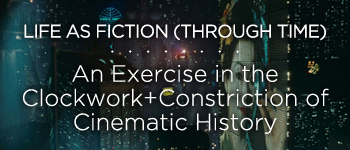
M by Fritz Lang is the yearly favorite from 1931 as listed in Life as Fiction (Through Time): An Exercise in the Clockwork and Constriction of Cinematic History, a project to chronicle my favorite film from each year since 1921.
1931 / Fritz Lang > How does M hold up to the test of time over similar cinema of the past (and recent times) that eventually fade from memory? Unlike others in the genre which have lost their luster due to overused plot twists, a simple sense of age or technical awkwardness, M stands firm because Lang’s filming is claustrophobic but not overdone. His storytelling is imaginative but coherent. His treatment of the villain is respectful but not apologetic. In fact, it still supersedes most of its successors in terms of intelligence and overall composition.
Nowadays, tension in serial killer films seem necessary to be represented throughout the running time. However, in M, the great beauty is in its objectivity. The serial killer himself—and his capture—is only part of the game. The cops and robbers, the bystanders and victims, they all play a part in the total landscape without overshadowing the other. Moreover, it’s impossible not to see what it’s influenced (most notably, in my mind, was Sympathy for Lady Vengeance). Increasingly, this is one of the few classics where a modern remake would be interesting just to see if 80 years of technology and know-how could actually trump the original.
Originally posted on July 10, 2007 before inclusion into (Through Time).
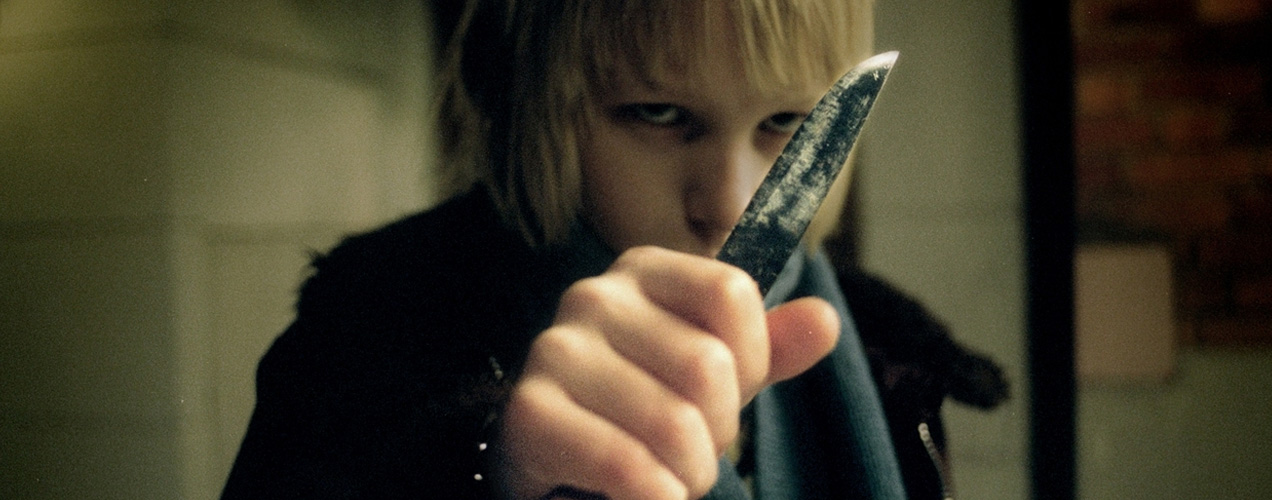
Let the Right One In

Let the Right One In by Tomas Alfredsson is the yearly favorite from 2008 as listed in Life as Fiction (Through Time): An Exercise in the Clockwork and Constriction of Cinematic History, a project to chronicle my favorite film from each year since 1921.
2008 / Tomas Alfredson > Ever since I first saw this by happenstance at the Tribeca Film Festival in 2008, it’s been stuck in my mind. Coming of age stories tend to hold a constant place in my heart, but the choicest of these only float around once in while. Each has its own little niche: Rushmore channeled overachievement and the quirkiness of Wes Anderson, Hana and Alice dove into the teenage dramatics of Shunji Iwai and Let the Right One In somehow molds youth, alienation and things that go bump in the night into one cohesive jolt. Alfredson has created a film rooted in a dark loneliness and an even darker elegance. Every scene and detail is necessary, and even those that come across borderline-kitschy end up making sense in context.
But let’s get the whole vampire bit cleared: This isn’t one of those bloodsucking genre films that go by-the-book in their treatment of the Draculan descendants. Just like Cloverfield was an episode of The O.C. with a monster in it, Let the Right One In is a coming-of-age love story that happens to include someone with a penchant for blood. It’s a surprisingly tactful method of curving an otherwise generic story into one of the year’s best films. Rarely does the script take the viewer’s intelligence for granted: myths are mostly hinted at, the gory visuals kept minimal and the camera angles respect our ability to extrapolate. The last sequence at the pool? It includes arguably the best scene in film from 2008. When Oskar’s eyes open up, it’s almost perfect.
Originally posted on March 12, 2009 before inclusion into (Through Time).
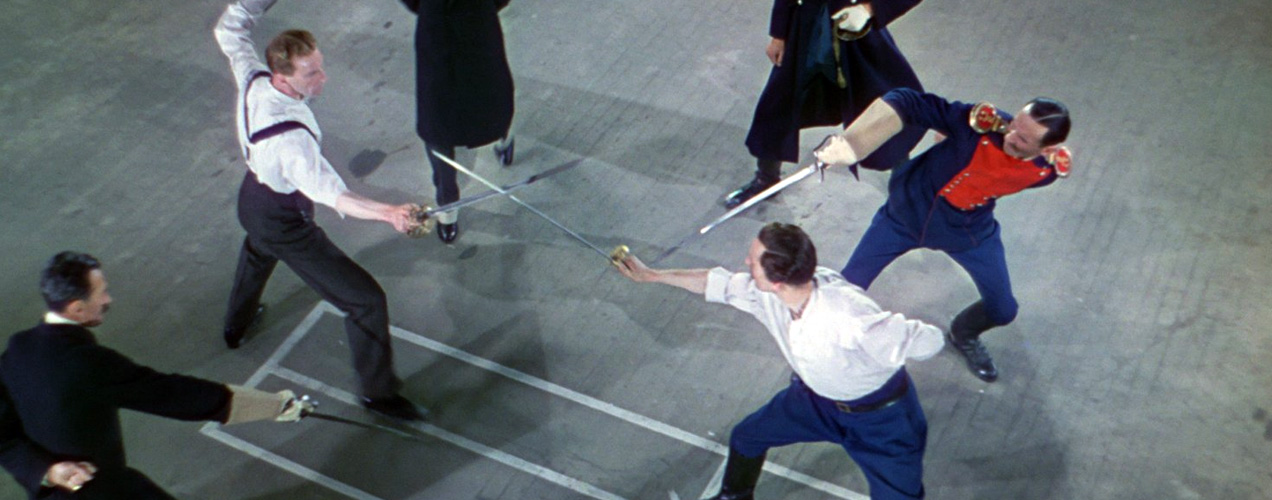
The Life and Death of Colonel Blimp

The Life and Death of Colonel Blimp by Powell & Pressburger is the yearly favorite from 1943 as listed in Life as Fiction (Through Time): An Exercise in the Clockwork and Constriction of Cinematic History, a project to chronicle my favorite film from each year since 1921.
1943 / Michael Powell & Emeric Pressburger > Why on earth would Winston Churchill want to negate the existence of a film about a gregarious British soldier who believes in the good fight and the love of a beautiful woman? Made at the height of the Nazi threat, The Life and Times of Colonel Blimp is a masterpiece chronicling forty-plus years in the life of Clive Candy, who we first meet after the unbeknownst-to-him British atrocities in the Boer War. This is a man whose military morals guffaw in disgust at the Germans and their war tactics. This is a man who believes the most important outcome of World War I was proof that the “good guys” could win. Much to Churchill’s annoyance, Powell & Pressburger question the gentlemen’s rules of warfare underneath the veil of a romantic epic. Does one stoop to the level of the Nazis in order to defeat them? What lengths would one go to in making sure that that Hitler was stopped before altering the world as we know it?
Roger Livesay’s performance as Candy is as joyful as it is tragic. It takes a while to get past all the sweetness on the screen before realizing Candy represents a great class of man, but one who may be completely outdated in today’s society. He loves and laments, but never is he anything short of a gentleman. His principles are strong, though it’s inevitable to pinpoint the naivety of his purposeful ignorance. Colonel Blimp may also be, most importantly, a reminder of how critical a time it was for our world at the height of Hitler’s regime. It affected how we approached and appreciated love, life and warfare. And now, nearly seventy years later, the film is equally as relevant in readjusting mindsets that blindly champion the goodness of the West vs. the evils of elsewhere.
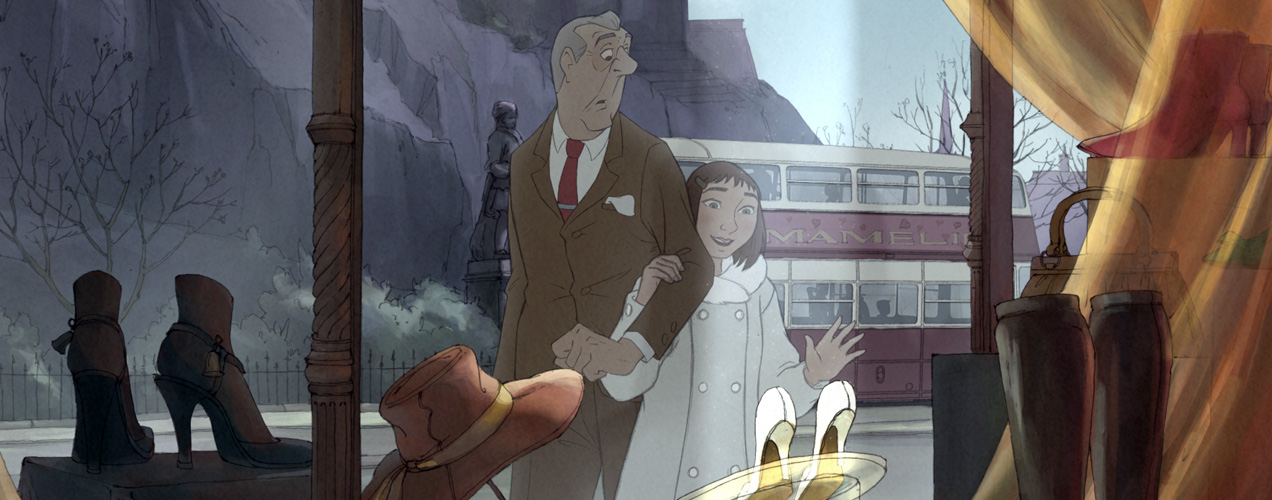
The Illusionist
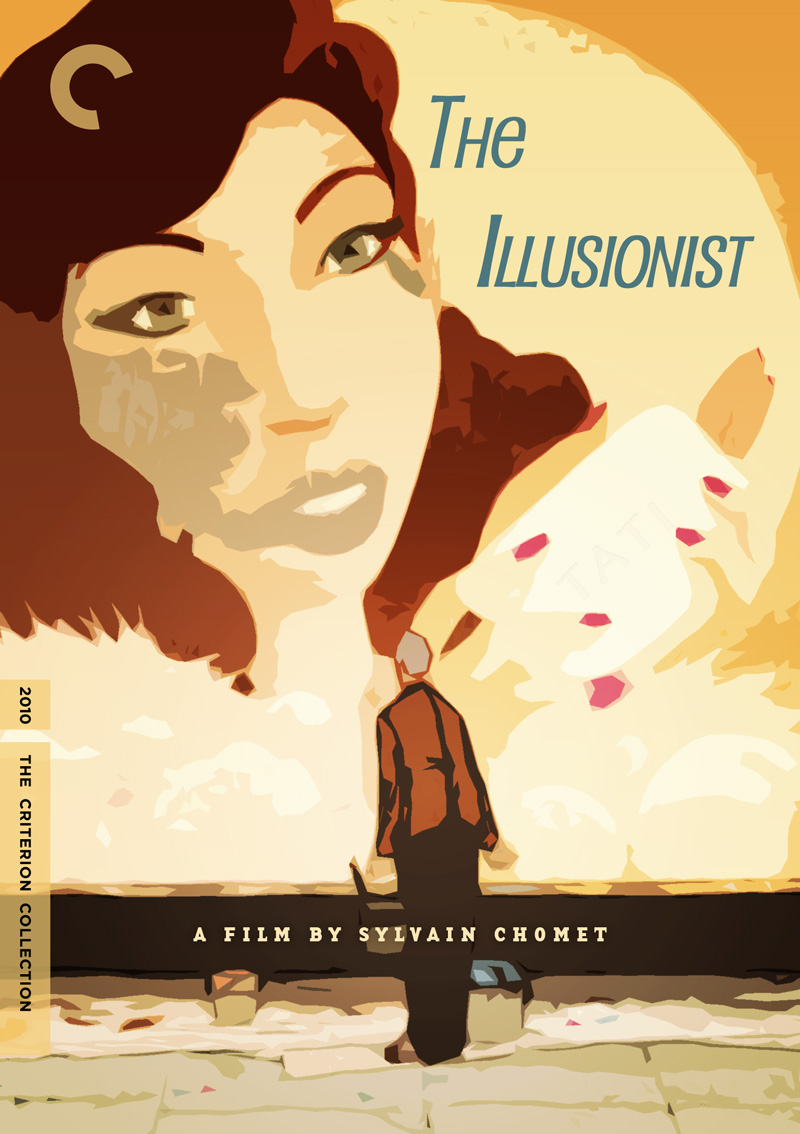
#3: The Illusionist by Sylvain Chomet. In the ten days leading up to the 83rd Annual Academy Awards, I listed my ten favorite films of 2010, each accompanied by a custom Criterion Collection cover inspired by Sam Smith’s Top 10 of 2010 Poster Project.
2010 / Sylvain Chomet > Charming. Heartbreaking. Wonderful. Chomet’s follow-up to the brilliant The Triplets of Belleville isn’t nearly as clever, but its story of lament and regret is equally as powerful. Originally written by iconic French filmmaker Jacques Tati in an attempt to reconciliate with an estranged daughter, L’illusionniste captures the kind of magic that cinema was always intended for. With almost no dialogue, Chomet is able to tug at our heartstrings with gorgeous, hand-drawn animation that transports us to a very different time and place. This isn’t earth-shattering stuff, but there’s something delightful in accompanying our magician in his twilight as he inadvertently becomes the guardian of a naive, young girl. His little tricks make us smile, but his inability to connect with the girl at a deeper level instills in us a tragic sense of eventuality. By not being explicit about their motivations, Chomet allows us approach the film how we choose. At a sparse 80 minutes, every scene is essential and none are heavy-hearted. Its beauty is in its simplicity, and it may be best watched on an overcast day as rain trickles down.

White Material
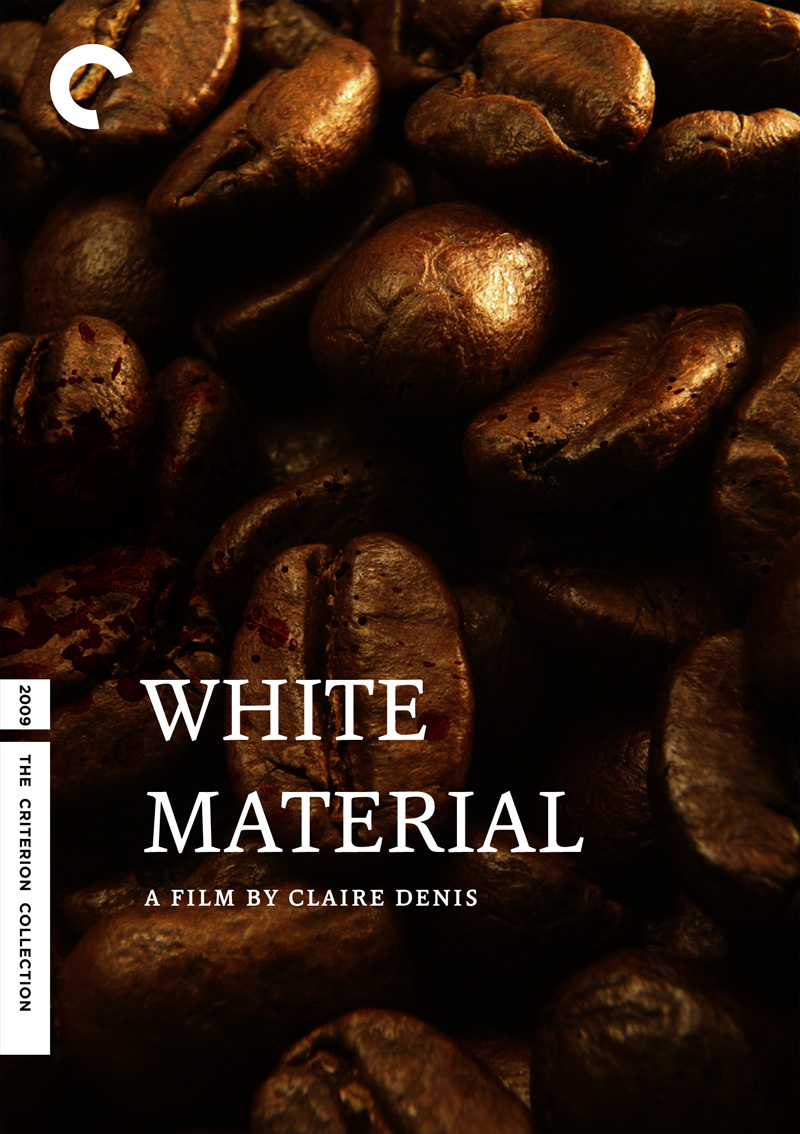
#4: White Material by Claire Denis. In the ten days leading up to the 83rd Annual Academy Awards, I listed my ten favorite films of 2010, each accompanied by a custom Criterion Collection cover inspired by Sam Smith’s Top 10 of 2010 Poster Project.
2009 / Claire Denis > Cinema has rarely treated colonialism with an objective eye. Instant disdain has been nothing short of what’s been expected in a society hellbent on correcting wrongs of the past by hurting the present and future. Everything from affirmative action in the United States to the black empowerment movement in South Africa has set us up for further clashes without actually understanding the roots of the troubles. Even the origins of something as ever-present as Islamic terrorism remain oblivious to much of society, but you can’t always blame them for it. The job of the mass media is to enrich and educate the lives of those who come home from a hard day’s work, but sensationalism has taken precedence in lieu of rational discourse.
So, where do we go from here? While PBS may be on its last legs, technological ease has paved the way for well-spirited blogs and open-minded films like White Material. Unlike the foundation of liberal guilt that pervaded Hotel Rwanda, Denis makes no apologies for what the white man has done to Africa. She accepts it as fact, but digs deeper into the mindset of those who stay behind when the proverbial revolution happens. How does one treat those who were born into colonial society? Do we look with contempt the second or third-generation offspring who’ve always considered the African soil their home?
White Material is rich with doubt: Will there be a tomorrow? Will we survive even if there is? Will we be wanted? It is Denis’ elegy to colonialism and represents the darkest corners of The African Queen. Isabelle Huppert is magnificent as Maria Vial, a woman trying to keep her coffee plantation functioning while the world around her falls apart. The enemies are both within and without, with additional tension provided by Maria’s disillusioned son (played by Nicolas Duvauchelle in one of the best supporting performances of 2010). This is a film that promotes understanding of a dying world, one that we’ve already been told is very, very bad. But not all people, even when part of a terrible injustice, are evil. Sometimes circumstance just kills.

Mr. Nobody
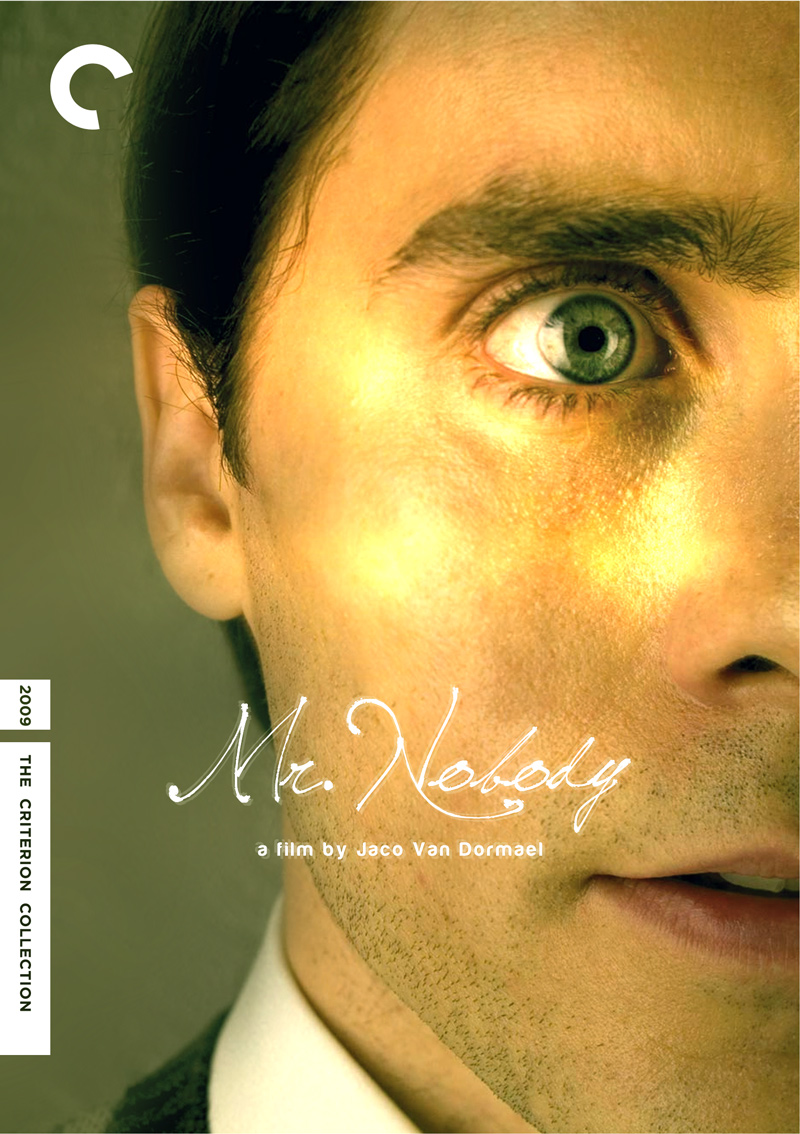
#7: Mr. Nobody by Jaco Van Dormael. In the ten days leading up to the 83rd Annual Academy Awards, I listed my ten favorite films of 2010, each accompanied by a custom Criterion Collection cover inspired by Sam Smith’s Top 10 of 2010 Poster Project.
2009 / Jaco Van Dormael > In the words of Lauryn Hill: “Everything is everything.” That may be Van Dormael’s message in Mr. Nobody, an ultracomprehensive look at living, decision-making and learning not to worry about the consequences. It can be argued that even on our deathbeds, we may not have the perspective to know if we’ve made an impact upon this world. But ultimately, our own happiness at the moment our eyes close may dictate how successful we’ve been. But while we’re on this earth, it’s impossible for our wandering minds not to second-guess our every decision. Fear not, however, as thanks to an angelic mishap, Nemo Nobody has a gift: He can live every life of every alternate universe that has ever been possible. And in our journey with him, we learn that the good can be bad, vice versa, and if anything, making the best of what you’ve got is really the only way to go.
Cinematically, Mr. Nobody is joy. Van Dormael’s passion and energy is embodied in every sequence, keeping us guessing, excited and caring. At the center, Jared Leto’s adult Nobody is an intriguing figure who we can’t ever pinpoint because, frankly, we’re not always sure which of his decisions we’re following. But none fascinates more than the younger Nemo, played by Toby Regbo (who’s soon-to-be the young Dumbledore in the second in installment of Harry Potter and the Deathly Hallows). His onscreen chemistry with Juno Temple evokes in the viewer a romanticized nostalgia about first loves. The strength of this carries itself throughout the film until it culminates in the purest of ways.
Always visually charming, Mr. Nobody is an emotional epic that’s somehow failed to get U.S. distribution despite having brand name actors and superb (at a nearly $50mn budget) production quality. While it may be a conceptual film at its core, unlike forced-puzzles like The Prestige where it’s more of a chore to connect the dots, there’s actual human satisfaction in discovering Nemo Nobody’s secrets. After all, the rationale for the film’s discordant structure is based on our own realities.

